
Oxford's student voices at COP29
As COP29 gets underway this week (11 - 22 November 2024), we meet the Oxford undergraduate and graduate students who have travelled to Baku to take part in the United Nations Climate Change Conference, and find out what they think should be top of the agenda for decision-makers.
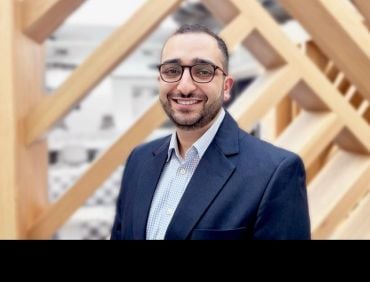 Benjamin Attia, a DPhil researcher in the Smith School of Enterprise and the Environment.
Benjamin Attia, a DPhil researcher in the Smith School of Enterprise and the Environment.
He said: 'By any definition and under any climate or transition future, there is a massive and growing gap between climate finance flows from the Global North to the Global South and the climate finance needs of the South.
The negotiation of the New Collective Quantified Goal (NCQG) for climate finance tops the agenda for negotiated outcomes of COP29, with key debates around how much the target should be, what kinds of capital should be in scope, who should pay and how that is determined, and what counts towards the target.
Ultimately the setting and implementation of the NCQG is about addressing both climate justice and energy inequality. I hope to see the new target include a number that starts with a 'T' and not a 'B', and for it to account for debt constraints and limited fiscal space of recipients, require more effective crowd-in of private sector investors, and allocate much more concessional capital.'
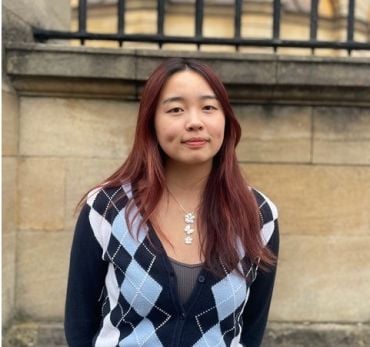 Ushika Kidd is co-President of Oxford Climate Society
Ushika Kidd is co-President of Oxford Climate Society
She said: 'At COP29 I will be representing student and youth voices, being a key point of contact between researchers in the Oxford delegation and other groups including the Global Alliance of Universities on Climate.
I aim to utilise my experience in environmental journalism to facilitate climate literacy and on-the-ground transparency about key COP29 processes and outcomes through articles and Oxford social media channels so we can push for ambitious global climate finance targets.'
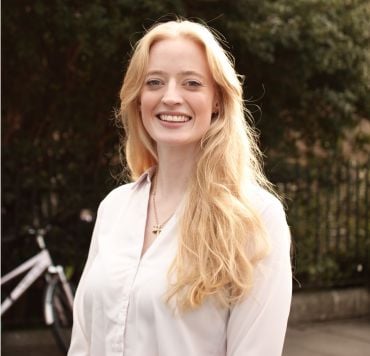 DPhil student Natasha Lutz is leading an Australian youth delegation at COP29.
DPhil student Natasha Lutz is leading an Australian youth delegation at COP29.
She said: 'The first global stocktake at COP28 last year highlighted the gap between current emissions reductions and the levels required, with shortfalls in both policy ambition and implementation.
I'm hoping some agreement can be made to mobilise sufficient funding for affected countries and communities through the New Collective Quantified Goal on climate finance as this is key for creating enabling environments for successful policy implementation.
Additionally, I am hopeful for progress in the Article 6 negotiations - the use of carbon markets remains a messy space, and clearer guidance under Article 6 is needed.'
 Flora Prideaux is in her third year at Oxford, studying for an undergraduate degree in history
Flora Prideaux is in her third year at Oxford, studying for an undergraduate degree in history
She said: 'As a 20-year-old undergraduate, I’m excited to help represent Youth voices within our delegation and at COP29 more broadly. I believe that interdisciplinary groups at higher education institutions play a huge role in climate governance processes. I hope to work to facilitate communication between researchers, resources, administration, and undergraduate students at COP through discussions, negotiations, and media resources.
I am also keen to focus on producing accessible information about COP29 itself, particularly for students and young activists, to work to ‘demystify’ COP through videos, social media, and written pieces. I’m excited to work with the other researchers and representatives of Oxford University to help make our goals happen.'
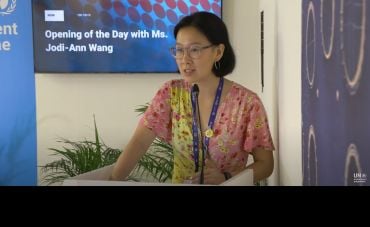 DPhil candidate Jodi-Ann Wang pictured at COP28. Credit: COP28 UNEP Pavilion
DPhil candidate Jodi-Ann Wang pictured at COP28. Credit: COP28 UNEP Pavilion
She said: 'I will be supporting the Children and Youth Constituency to the UNFCCC, while also presenting some of my latest research around justice and finance in events. With the Constituency, I will be closely tracking the New Collective Quantified Goal (NCQG) on climate finance and the Just Transition Work Programme.
I hope we can reach NCQG outcomes with integrity around who contributes, what amount, as well as transparency and accountability mechanisms that do not compromise the incontrovertible legal obligations of developed countries to contribute. On the Just Transition Work Programme, I hope to see more recognition of historical damages, power imbalance, and how one country's transition can create injustices in other communities.'
 Srijani plans on interviewing young people at COP29
Srijani plans on interviewing young people at COP29
She said: 'The NCQG is about more than just increasing climate finance - it's much more about the quality of climate finance being mobilised for mitigation and adaptation efforts in Global South countries. I hope at COP29 we are able to focus more on the quality and accountability aspect to be able to create a truly just climate finance regime.'
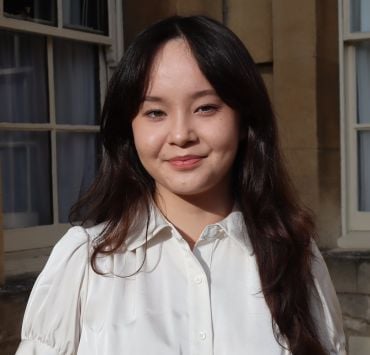 Sophia Suganuma, a Politics, Philosophy, and Economics student.
Sophia Suganuma, a Politics, Philosophy, and Economics student.
As the founding Finance Director, Sophia has fundraised nearly half a million USD from groups like Google and L’Oreal, and led partnerships with the World Bank Group Connect4Climate and the World Economic Forum #GenerationRestoration. Her interests include grassroots movements, youth, climate finance, and multilingual climate education.
Sophia has spoken about her activism at events with the UN Environmental Programme, US NOAA, US FEMA, the US EPA, the Smithsonian, UN Migration, UN Habitat, and UN Food and Agriculture Organization.
She said: 'My hope is that the over 1 billion youth around the world are given a platform. We currently receive less than 0.76% of all climate funding. Now, more than ever, corporations, governments, and organizations should fund the future by investing in youth initiatives.'
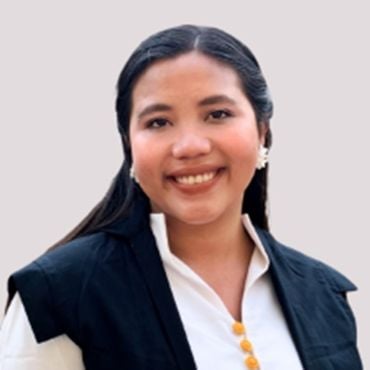 Graduate student Pan Ei Ei Phyoe is a climate and water specialist
Graduate student Pan Ei Ei Phyoe is a climate and water specialist
With a focus on the Tana River Basin in Kenya, her work underscores the critical need for tailored climate information to address water challenges in regions prone to climate extremes. Leveraging her background in water resource engineering and social science, she develops an interdisciplinary framework to assess and fulfil water managers’ climate information needs, aiming for sustainable and adaptive water governance.
Previously, she worked as the Climate and Water Specialist at the UNFCCC COP28 Presidency at the UAE.
She said: 'As COP29 is recognized as the Finance COP this year, I am hopeful that parties will agree on establishing a New Collective Quantified Goal for climate finance, aimed at significantly scaling up funds to support developing nations in their climate adaptation efforts in a measurable and accountable way.'
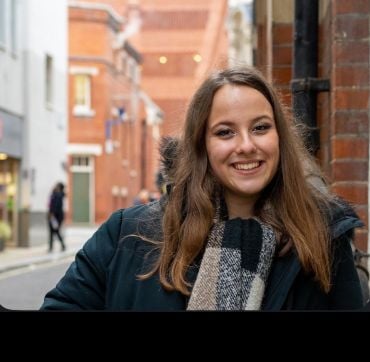 Emma Somos, a DPhil student in the Department of Sociology.
Emma Somos, a DPhil student in the Department of Sociology.
She is part of the COP working group at the UK Youth Climate Coalition and works as a Deputy Research Director at Climate Cardinals. She also works as a research assistant at the Blavatnik School of Government, where she also organized the Social Outcomes Conference 2024 working at the Government Outcomes Lab.
She said: 'At COP29, as part of UKYCC’s delegation, I will be campaigning for the negotiation of a comprehensive conflict of interest definition and policy in the UNFCCC to combat the worrying trend of increasing levels of fossil fuel lobbyists entering COP negotiations. New analysis from Kick Big Polluters Out (KBPO) shows that at least 1,773 coal, oil, and gas lobbyists have been granted access to the UN climate negotiations in Baku, outnumbering the delegations of almost every country at the conference. Hopefully for COP30, there will be more transparency required and decreased access for these industries to influence negotiations, which is crucial to achieve fossil fuel phase-out.'
 10 years on: The Oxford learning centre making an impact
10 years on: The Oxford learning centre making an impact Oxford and The Brilliant Club: inspiring the next generation of scholars
Oxford and The Brilliant Club: inspiring the next generation of scholars New course launched for the next generation of creative translators
New course launched for the next generation of creative translators The art of translation – raising the profile of languages in schools
The art of translation – raising the profile of languages in schools  Tracking resistance: Mapping the spread of drug-resistant malaria
Tracking resistance: Mapping the spread of drug-resistant malaria Cities for cycling: what is needed beyond good will and cycle paths?
Cities for cycling: what is needed beyond good will and cycle paths?